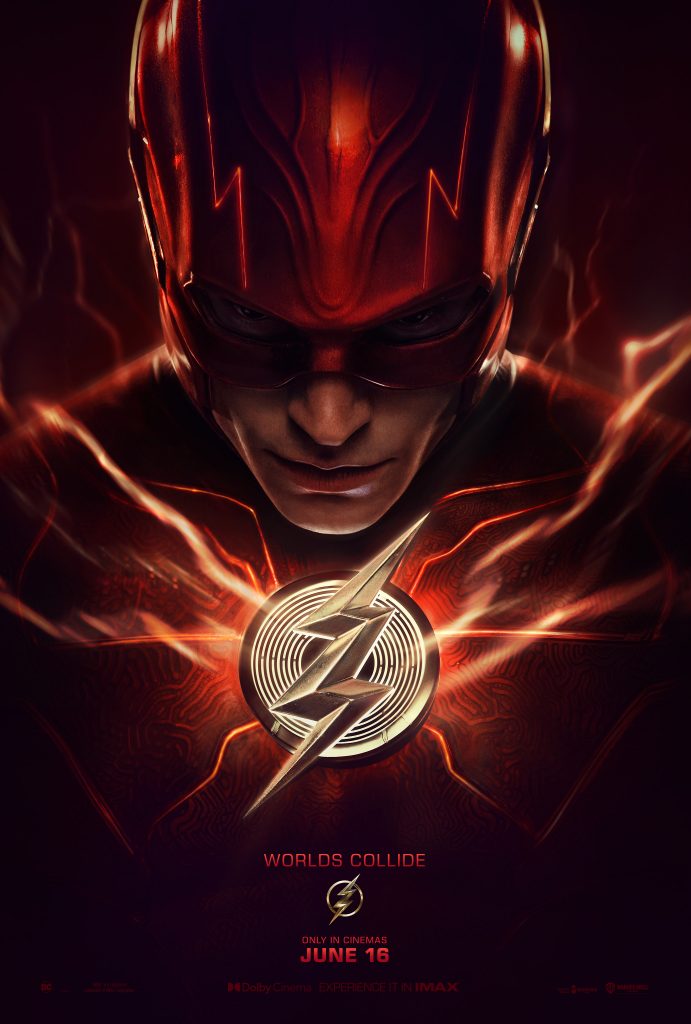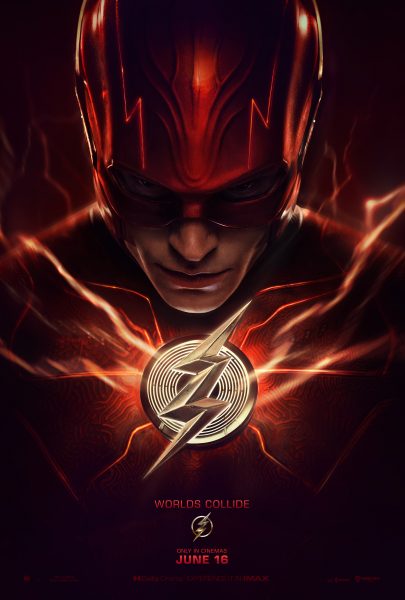At last year’s CinemaCon, exhibitors were wowed by new footage from Warner Bros.’ The Flash, starring Ezra Miller as the speedy superhero whose attempts to alter the past bring about a world under the thumb of the warlike General Zod (Michael Shannon). It’s been a long road to a headlining role for the DC superhero, who was introduced into the current DC film canon with a cameo appearance in 2016’s Batman v Superman: Dawn of Justice. Seven years later, this June 16, the Flash’s first solo movie finally hits the big screen—but not before a stop-off at this year’s CinemaCon.
The Flash’s sibling filmmaking team of Andy (director) and Barbara (producer) Muschietti, who previously teamed with Warner Bros. for It and It: Chapter 2, will be in Las Vegas for CinemaCon to receive the International Filmmakers of the Year Award during Monday’s International Day lunch and awards ceremony; the following day, at Warner Bros.’ presentation of the studio’s upcoming slate, CinemaCon attendees will get a closer look at one of the most highly anticipated movies of the summer. As excitement for The Flash mounts, the Muschiettis, originally from Argentina, speak to Boxoffice Pro about the film’s road to cinemas.
This interview was conducted prior to The Flash‘s debut at CinemaCon in April 2023.
From your first feature, the 2013 horror film Mama, to the It films, to Flash—you’ve helmed movies that are progressively bigger in scope. Does that change how you approach the material?
Andy: I have a two-pronged answer. In one way, the approach doesn’t change. The emotional values that I need in a story stay the same. I cannot make a movie without them. If there’s a strong emotional core, I am interested, and the audience is interested and engaged. This goes for anything I do, regardless of the scope or budget.
On the other hand, the visual approach does change. From an intimate horror story to a multidimensional time travel superhero adventure, the visual aspects of the storytelling have to be different. Obviously, the exploration and search for visual expression is key regardless of the genre, but the visual scope changes. Action-adventure storytelling comes with larger budgets that allow and require the use of more extensive visual imagination. For instance, how do I tell time travel on The Flash? How do I show time travel in a new, exciting way? Set pieces invite scale. I love dreaming of big landscapes, and for that I use a different visual mindset than when I am telling more contained stories.
It feels almost like the closing of a loop when The Flash opens in June—there’s been a long list of projects that have been in the works for what feels like ages, and they kept getting pushed down the schedule due to the pandemic. How does it feel to finally be able to show the film to an audience?
Barbara: Of course, it feels great. We have worked solidly on The Flash for almost four years. We are very grateful to WB for working with us on using all this time to make the movie better. The pandemic allowed us to have a longer development, and, on the other side of shooting, it allowed us to have the time to explore visual effects like never before. We all knew that The Flash belongs in movie theaters, and we were happy to wait for the right time.
CinemaCon is one big party for the cinema community. We all love movie theaters. What were your moviegoing habits as kids? What was your hometown theater like?
Andy and Barbara: Our parents are cinephiles and grew up going to double features. So, when we were little kids, they would take us to the movies all the time. The drive-in was the best adventure! The four of us would sit on our Chevy’s front seat and be mesmerized. That’s how we saw Close Encounters [of the Third Kind]. We would go to our neighborhood theater all the time: the York, the Astro [in Buenos Aires]. And for very special films, our mom would take us downtown to meet our dad after work, and we would go to the big theaters. We saw Star Wars and Indiana Jones at the Calle Lavalle theaters. Winter break from school meant that for two weeks we would go to the movies every day. Pure magic!
Premium formats are really huge (no pun intended) right now. When you’re creating a film, do you think about the format it might be seen in (say, Imax vs. a more traditional screen vs. someone’s phone or smartwatch)?
Andy: Of course, I do. I want our movies to be enjoyed in a communal space, in a theater where they are being played at the levels that we designed the movies to be at. Any format that gives a more spectacular experience is obviously a plus. The bottom line is to give the audience two-plus hours of an emotional ride, where they forget about the world outside and mostly about the smartphones in their pockets.
Barbara, since you’re working on the production side, is that something you think about—how the film will be exhibited?
Barbara: We both think about this from pre-production, through production and post. It’s inconceivable to go through the gargantuan effort of making a movie without being laser focused on how and where it will reach port. We tell stories that are experiences in themselves. Anything that allows us to enhance that experience puts us closer to our ultimate goal: We want people to leave the theater feeling electrified. Show me one person that feels truly moved from watching a film on a smartphone.
Do you remember the first movie you saw at a theater? Or an early moviegoing memory?
Andy: Watching Close Encounters with my parents and my sister at the drive-in. I was 4 years old. I remember every second of that night, and I remember the impact the movie had on me.
Barbara: Although I know I had been to the movies before, the first movie I remember is Sleeping Beauty (Walt Disney). I was 4. I remember it because I was not drawn to animation as a little kid, but Sleeping Beauty blew me away.
Concessions when you go to the movies: yea or nay? And what do you get?
Andy: Yes, of course, but I hate that my sister always gets loud with her bucket of popcorn.
Barbara: Definite yes. I also appreciate variety. I don’t always feel like popcorn. Sometimes I just want cookies and coffee. Variety is key.
Several films in the DCU have gone day-and-date due to really awful Covid circumstances. Was it ever a question that The Flash would be released in cinemas?
Andy and Barbara: No. The only way to release The Flash is in theaters. Warner’s knew that, and we knew that.
What is your background on this character and comics in general? Are you coming in as fans already, or do you have fresh eyes on it?
Andy: I was a big comic book reader as a young child. Especially Superman, Batman, and Atom. As I hit pre-puberty, I left comics for books and movies. I fell back in love with comics as an adult. The Flash then became one of my favorites.Barbara: I was not into comic books as a child. I was always a bookworm. I loved Greek mythology. In my 30s, I started reading graphic novels, and that took me to discover comics. Now I am a consumer.




Share this post